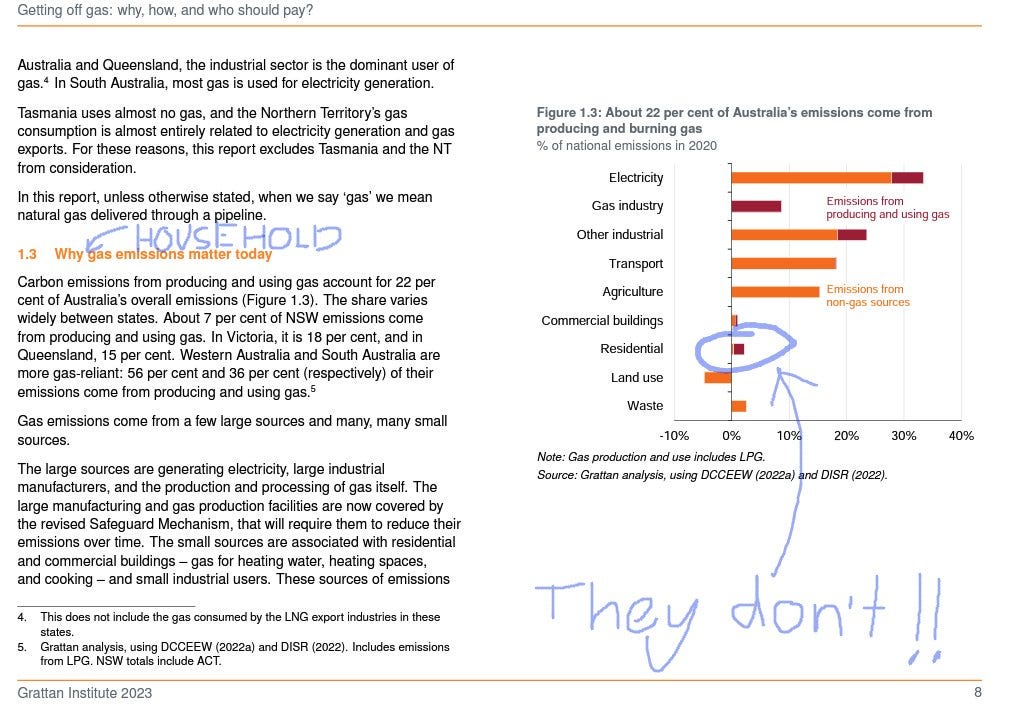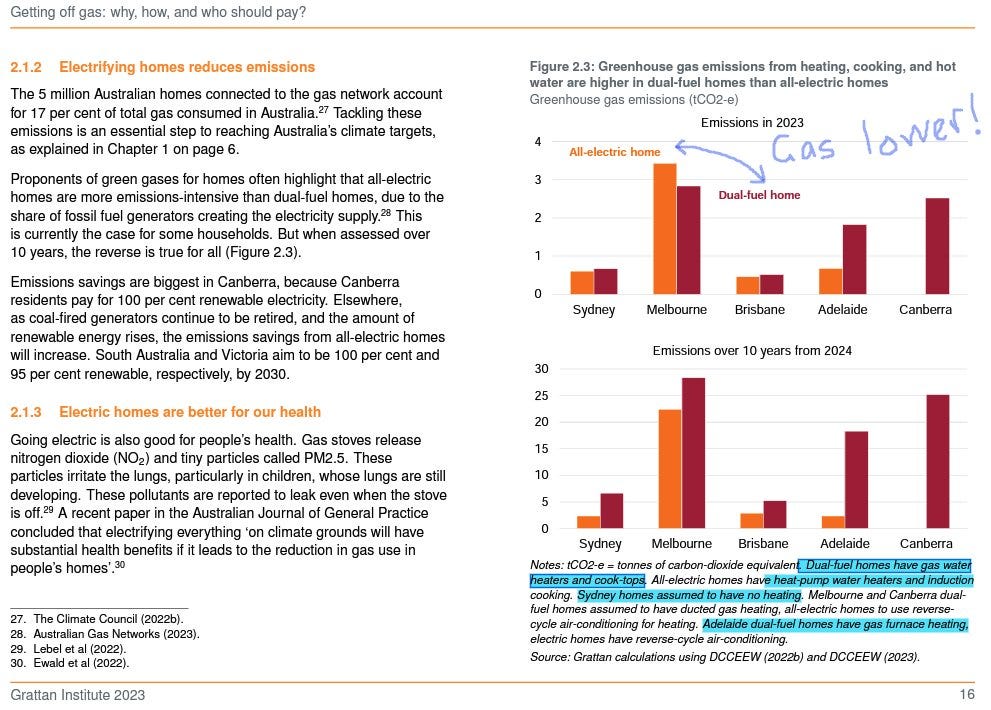Grattan’s gas gimmick
To jump on the bandwagon they must ignore their own analysis
It saddens me to say this, but it's clear now that the Grattan Institute has caved. They're now ignoring and obfuscating their own research in order to bandwagon with fashionable vanity projects that have trivial environmental value and significant economic costs.
In this case, the bandwagon is converting residential household gas appliances for heating and cooking to electricity.
Their new paper, entitled Getting off gas, opens by asserting that getting off gas matters because of greenhouse gas emissions. The big scary number they promote about the share of Australian emissions from gas is 22%.
But their own graph shows that households are a tiny fraction of that 22%. They avoid quoting the actual proportion of total emissions from household gas (which is shameful). It looks to be only around 2% to me.
They basically skip the serious gas emissions from electricity production and heavy industry (there's a brief mention in Section 8 of the report), and proceed to dedicate Sections 2, 3, 4, 5 and 6, to the trivial household emissions.
Why?
Because the vibes say it’s an easier place to start.
Then comes the bombshell that collapses the entire premise of the paper.
In Melbourne, which dominates household gas use, switching off gas increases emissions! Only a 10-year projection based on a slew of assumptions just slightly tilts the switch from gas to electric in Melbourne to be favourable in terms of emissions.
This matters because Melbourne dominates household gas consumption. Adelaide, Canberra and Brisbane don't really matter at all.

One of their key assumptions is that all-electric homes have heat-pump hot-water systems, which use around a third of the energy of conventional electric systems. Weakening this assumption alone is enough to overturn the benefit that Grattan ascribes to a switch. Currently, these systems are quite rare. There’s good reason to think they’ll remain so - they cost double (according to Grattan) what an instantaneous gas system costs.
So if everything goes perfectly with Victoria's energy transition (it won't), and we assume electric homes have super-expensive, super-efficient water heaters (they don't) then in ten years an electric switch might reduce household emissions—a tiny little bit.
Grattan doesn’t name the number of this reduction, (another shameful omission) but from the published graphs I’d guess it is no more than 20% of emissions from current household gas use. (Which are ~2% of overall emissions.)
But wait, is the electric grid ready to take the extra load of those cooking and heating demand peaks switching from gas to electricity?
Nope.
By Grattan's own analysis, the grid upgrade in Victoria would cost $5.7 billion.
They shamelessly try to walk their own analysis back at this point. In doing so, they ignore the engineering costs that demand peaks impose, claiming that some headroom 'for the vast majority of the year’ has value (it doesn't).
Furthermore, this price doesn't include generators, which are meant to be increasingly intermittent, and worse in winter. Squaring that circle will be expensive at best. It’s much more likely that getting off gas would make it harder to get off coal, which is the true source of the bulk of Australian emissions (and reliable electricity on winter nights).
The entirety of Section 7 is basically devoted to discussing how extremely difficult it will be to finish what was so gladly proclaimed in Section 2 as the easiest place to start. And yet somehow, they avoid actually revisiting the conclusion that the endeavour should, in fact, be started.
A true summary of Grattan's paper is as follows:
Household gas emissions are trivially small (~2% of Australian emissions).
And they mostly come from Melbourne, where a switch to electricity would increase emissions
Unless we spend roughly $6 billion on grid upgrades, plus everything else required to make renewables reliable in winter, plus subsidies or incentives to switch appliances.
And even then, after ten years of unrealistic assumptions, it would be only be a small (~20%) reduction of the ~2% of the emissions that household gas comprises. That’s less than 0.5%.
‘Getting off gas’ is an expensive vanity project by any measure.








Great article. If I may ask, assuming this goes ahead, who would benefit? (Which industries, suppliers, stakeholders, etc.)
Very eye opening analysis. Shows what a lemon subsidising retrofitting is in VIC. But I guess after reading there's still a case for banning gas from new builds so that the housing stock renewal becomes the transition mechanism and merely cuts off growth in gas demand rather than adding to it. It seems more in line with the timeframes and minimal cost given it eliminates building new gas infrastructure and doesn't involve retrofitting.
But no doubt banning it from new builds seems too boring/vanilla